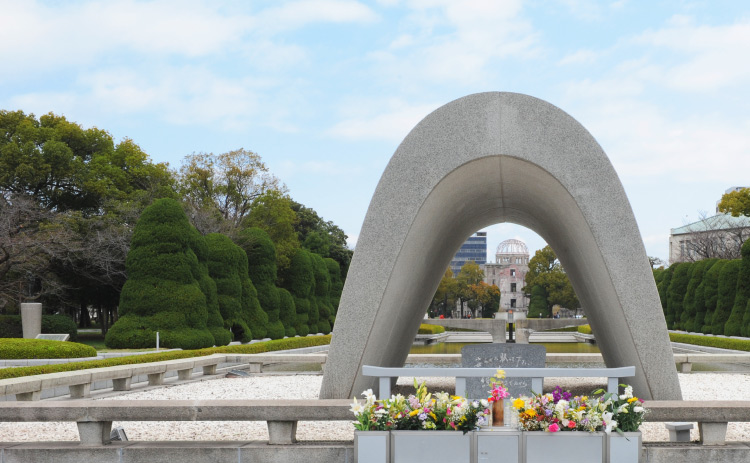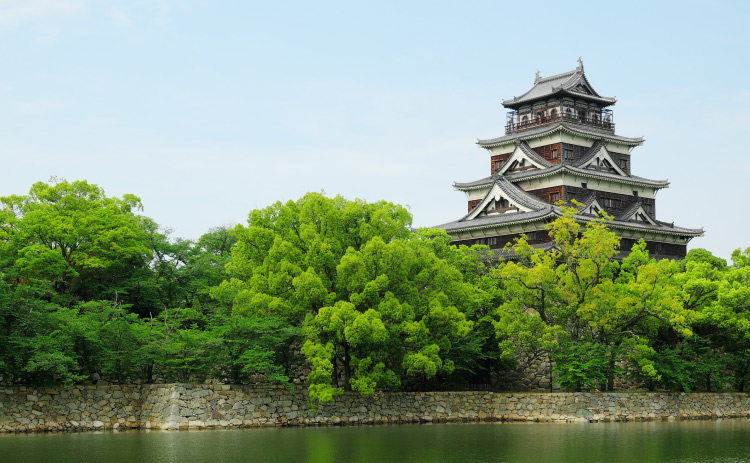Showcasing to the world the beauty of Japan, and the hope for peace
Hiroshima Prefecture, home to two World Heritage Sites - Itsukushima Shrine and the Atomic Bomb Dome
Hiroshima Prefecture is located in the Chugoku region in western Honshu, Japan’s main island. The prefecture has a distinct steeped terrain of the Seto Inland Sea in the south, and lowlands and highlands expanding to the Chugoku Mountains in the north. Within the abundant environment of Hiroshima is a deep history and rich culture, and an intricate and impressive natural landscape.
Miyajima of Aki, one of Japan’s three most scenic spots. Built to stand on the sea of Miyajima, Itsukushima Shrine is an exceptional example of Heian era palatial architecture and well-known as a sea shrine. The mythical-like scenery it creates has earned Itsukushima Shrine recognition as a World Cultural Heritage Site. On August 6, 1945, Hiroshima became the first city in the world to be devastated by an atomic bomb. The legacy of this tragedy is Hiroshima’s message to world of the horrors of war, and the preciousness of peace. Many tourists from around the world visit the World Cultural Heritage Site Atomic Bomb Dome, which has become a reminder of the devastation that occurred during the bombing, and a symbol of the need to abolish nuclear weapons and realize lasting peace.
Hiroshima is well known for its food, including oysters, conger eel rice (anagomeshi), and lemons. It is also famous as Japan’s top producer of oysters, accounting for about 70% of the country’s total production. You can enjoy delicious Hiroshima oysters, which have a distinctive rich taste and succulent flesh, all year round. Another must-try local delicacy is the Hiroshima-style okonomiyaki. It is known as the soul food of Hiroshima locals, who love to feast on this savory pancake filled with vegetables, seafood, noodles and other ingredients cooked on a thin layer of batter.
Touring the uniquely individual islands floating on the Seto Inland Sea is another great way to explore this region. The Seto Inland Shimanami Kaido car-only expressway connects these islands by a series of bridges stretching around 60 km in total, from Onomichi City in Hiroshima Prefecture to Imabari City in Ehime Prefecture. Alongside the expressway is a lane for bicycles and pedestrians, making the Shimanami Kaido a popular cycling road as well. Although Hiroshima Prefecture faces the sea, it also has mountains and forests that are fun to ski in during winter and great for enjoying many other activities throughout the year. There are plenty of places to fully immerse yourself in Hiroshima’s mountains, including Mount Azuma and Mount Dogo for beginner mountain climbers, and the scenic Sandan-kyo ravine for trekking. Blessed with the natural beauty of the mountains and sea, Hiroshima Prefecture is the perfect place to enjoy the seasonal scenery of Japan. We hope you will explore and enjoy all that Hiroshima Prefecture has to offer.
Read more
Hide
Hiroshima Prefecture, home to two World Heritage Sites - Itsukushima Shrine and the Atomic Bomb Dome
Hiroshima Prefecture is located in the Chugoku region in western Honshu, Japan’s main island. The prefecture has a distinct steeped terrain of the Seto Inland Sea in the south, and lowlands and highlands expanding to the Chugoku Mountains in the north. Within the abundant environment of Hiroshima is a deep history and rich culture, and an intricate and impressive natural landscape.
Miyajima of Aki, one of Japan’s three most scenic spots. Built to stand on the sea of Miyajima, Itsukushima Shrine is an exceptional example of Heian era palatial architecture and well-known as a sea shrine. The mythical-like scenery it creates has earned Itsukushima Shrine recognition as a World Cultural Heritage Site. On August 6, 1945, Hiroshima became the first city in the world to be devastated by an atomic bomb. The legacy of this tragedy is Hiroshima’s message to world of the horrors of war, and the preciousness of peace. Many tourists from around the world visit the World Cultural Heritage Site Atomic Bomb Dome, which has become a reminder of the devastation that occurred during the bombing, and a symbol of the need to abolish nuclear weapons and realize lasting peace.
Hiroshima is well known for its food, including oysters, conger eel rice (anagomeshi), and lemons. It is also famous as Japan’s top producer of oysters, accounting for about 70% of the country’s total production. You can enjoy delicious Hiroshima oysters, which have a distinctive rich taste and succulent flesh, all year round. Another must-try local delicacy is the Hiroshima-style okonomiyaki. It is known as the soul food of Hiroshima locals, who love to feast on this savory pancake filled with vegetables, seafood, noodles and other ingredients cooked on a thin layer of batter.
Touring the uniquely individual islands floating on the Seto Inland Sea is another great way to explore this region. The Seto Inland Shimanami Kaido car-only expressway connects these islands by a series of bridges stretching around 60 km in total, from Onomichi City in Hiroshima Prefecture to Imabari City in Ehime Prefecture. Alongside the expressway is a lane for bicycles and pedestrians, making the Shimanami Kaido a popular cycling road as well. Although Hiroshima Prefecture faces the sea, it also has mountains and forests that are fun to ski in during winter and great for enjoying many other activities throughout the year. There are plenty of places to fully immerse yourself in Hiroshima’s mountains, including Mount Azuma and Mount Dogo for beginner mountain climbers, and the scenic Sandan-kyo ravine for trekking. Blessed with the natural beauty of the mountains and sea, Hiroshima Prefecture is the perfect place to enjoy the seasonal scenery of Japan. We hope you will explore and enjoy all that Hiroshima Prefecture has to offer.








